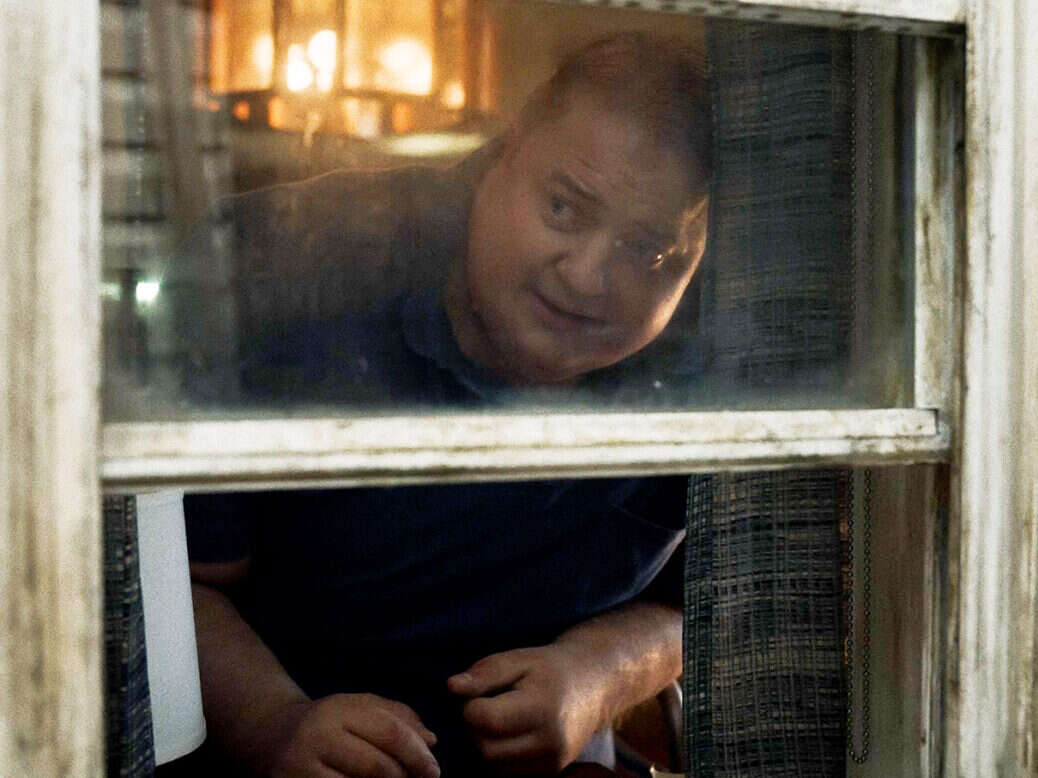
It’s thought that 42 per cent of American adults are obese, and 18 per cent severely so. The reasons, it is suggested, are complex and multi-factorial. Darren Aronofsky’s film The Whale offers a simpler explanation: here obesity is presented as an individual tragedy, a response to intolerable unhappiness. Charlie (Brendan Fraser, Oscar-nominated for this role) is a middle-aged English professor, so overweight that he is about to die of congestive heart failure. For the part, Fraser wore a fat suit that itself weighed 100lbs, took four hours each day to put on, and an hour to take off.
Charlie makes a living teaching writing composition classes on Zoom, switching off his camera so he can’t be seen, but is otherwise completely shut inside a small, dark apartment somewhere in Idaho. He can only stand with a walker, reach things with a grabber and get about in a double-width wheelchair. We see Charlie scoffing meatball subs and buckets of fried chicken, as well as daily deliveries of monster pizzas, all gobbled down unchewed. The sound design is cruelly emphatic.
[See also: Spielberg’s The Fabelmans is a major and personal work]
It is not fast food that has brought him here, we learn, so much as sorrow. Charlie, before he got so big, was married and had a daughter. But when she was eight, he left the family for one of his students – the love of his life, Alan – and lost all contact with his daughter. Alan, from an evangelical background, was rejected by his family and, tormented by guilt, died. Charlie has been assuaging his grief with food ever since.
The Whale began as a 2012 stage play by Samuel D Hunter, drawing on autobiographical elements (English teacher, fundamentalist background, Idaho-raised, gay, eating issues). Aronofsky, a specialist in torment, (Black Swan, mother!, etc) saw it off-Broadway and determined to make it into a film. Hunter has written the screenplay and it has been minimally adapted, remaining absolutely a play.
It is with dawning horror we realise that, after our introduction to Charlie urgently masturbating to gay porn on his laptop and suffering a near fatal heart spasm as a result, we are never going to leave this dark, dismal apartment (or set) for the duration of the film. Like Charlie, we have been shut in. It is true that we are not stuck with a static viewpoint – cinematographer Matthew Libatique moves the camera around inside the flat with an agility that seems at times almost to mock Charlie’s lumbering – but the effect remains crushingly claustrophobic, an enclosure furthered by a boxy screen ratio, gloomy lighting, and music that could accompany a documentary about genocide.
The drama can proceed only as in a play. Charlie can’t leave, so the other characters have to keep popping in, turn and turn about. There’s his nurse and friend Liz (sparkily played by Hong Chau, Oscar-nominated for Best Supporting Actress), who both urges Charlie to go to hospital and brings him more of the food that is killing him. Later, it emerges she is Alan’s adopted sister, enraged by the fundamentalists too. There are also repeated calls from a young missionary at that New Life church (Ty Simpkins) who turns out not to be such a goody-goody as he pretends.
The main visitor, though, is Charlie’s estranged, angry teenage daughter Ellie (Sadie Sink from Stranger Things) whom Charlie, knowing he is on a clock, wants to be reconciled with before he dies, if necessary just by giving her all his money. It’s uphill work, since she’s abusive and malevolent – nothing less than “evil” says her mother (Samantha Morton), making a brief appearance. But Charlie, despite being a physical wreck, cruelly bereaved, guilty, still looks on the bright side, and sees the best in everybody. He’s delighted with Ellie – “I couldn’t ask for a more amazing daughter”. When he discovers she’s said on social media “there’ll be a grease fire in hell when he starts to burn”, he only responds, “She’s a strong writer.” “People are incapable of not caring – people are amazing,” he testifies. Charlie and his author may have turned against fundamentalism but religion has a way of returning: he is Christ-like, crucified by his own weight.
Brendan Fraser, cherished for his earlier roles as an endearing naïve, performs miracles in making Charlie likeable, despite the set-up and the prosthetics. He may well take the Oscar. It is just such a performance – physically transformative, daring to be ugly – that the Academy most admires, especially when combined with a comeback story such as Fraser’s own: from injury and suffering alleged sexual assault. Enduring such an awful play is a high price to pay to see some acting, though.
This article was originally published on 27 January 2023.
[See also: Why the father-daughter drama Aftersun deserves all the awards]
This article appears in the 01 Feb 2023 issue of the New Statesman, The Great Housing Con




